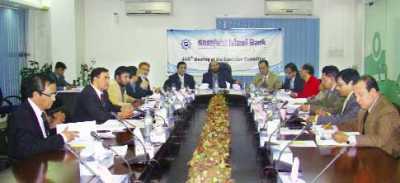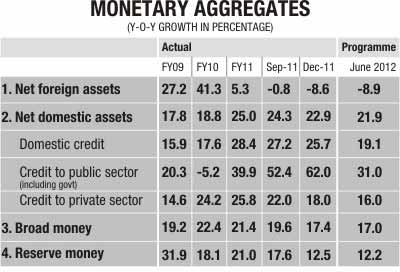Banking
Southeast Bank holds business confce
Southeast bank Limited has organized seminar on “Business Policy and Planning Conference” at hotel Ruposhi Bangla in the city recently.
Mahbubul Alam, managing director of the bank presided over the conference while Alamgir Kabir, FCA, chairman of Southeast bank was present as chief guest, said a press release.
Among others, vice chairman, Ragib Ali, directors MA Kashem, Azim Uddin Ahmed, Jusna Ara Kashem, Duluma Ahmed, Syed Shahid Ali, Rehana Rahman, Dr Zaidi Sattar, AHM Moazzem Hossain, advisor Zakir Ahmed Khan and all deputy managing directors and heads of branches and divisional heads were present at the conference.
Alamgir Kabir, chairman of the bank expressed deep satisfaction on the overall business success of the bank. He urged upon the bank employees to maintain the pace of progress in banking business.
Mahbubul Alam, managing director of the bank thanked the employees for the overall success of the bank during the period January 2011 to December 2011.
He advised senior executives of the bank, especially, the head of branches and divisional heads to put extra efforts for achieving the targets for the year 2012.
The Daily Sun/Bangladesh/ 27th Jan 2012
SJIBL holds EC meet
 Alhaj Mohammad Hasan, chairman of Shahjalal Islami Bank Limited, presides over an executive committee meeting in the city recently.
Alhaj Mohammad Hasan, chairman of Shahjalal Islami Bank Limited, presides over an executive committee meeting in the city recently.
The 468th meeting of the executive committee (EC) of the Shahjalal Islami Bank Limited was held at its head office in the city recently.
Alhaj Mohammad Hasan, chairman of executive committee of Shahjalal Bank presided over the meeting, said a press release.
The executive committee members discussed various issues relating to investment in different sectors of the Bank.
Among others, directors Alhaj Sajjatuz Jumma, Alhaj Akkas Uddin Mollah, Alhaj Engineer Md. Towhidur Rahman, Alhaj Mohammed Solaiman, Alhaj Mohiuddin Ahmed, Alhaj Tofazzal Hossain, managing director Md. Abdur Rahman Sarker, additional managing director Md. Mukhter Hossain and deputy managing director Md. Abdul Jabber Chowdhury were present at the function.
The Daily Sun/Bangladesh/ 27th Jan 2012
BB signs deal with S’porean firm to install NPS
Bangladesh Bank has taken initiatives to set up the National Payment Switch (NPS) to modernise the existing electronic payment system.
The central bank has signed an agreement with ‘Infotech Global Private Ltd’, a Singapore-based company on Thursday to implement the project.
The NPS project is being implemented BB under the ‘Central Bank Strengthening Project’, financed by the World Bank.
The NPS is included with the national information and communication technology policy-2009 of the government.
Project Director of NPS and Executive Director of BB, Md Ahsan Ullah presided over the signing ceremony where BB’s Executive Directors-- Dasgupta Ashim Kumar, Md Abdul Hamid and other senior officials of BB and Infotech Ltd were also present.
Infotech was given the contract through an open international tender.
IBCS Primax Bangladesh Ltd, a local IT firm, has been working with this project as the local representative in implementing the project.
The Daily Sun/Bangladesh/ 27th Jan 2012
Atiur dispels CRR rumour
The central bank yesterday refuted rumours on slashing the cash reserve ratio (CRR), which is the amount of cash that banks have to hold in reserve.
“It will be considered only after the inflation rate comes down to 7-8 percent,” Dr Atiur Rahman, the central bank governor, told reporters at the launch of the monetary policy statement for January-June.
It was rumoured in the money and capital markets that Bangladesh Bank would reduce the CRR by 50 basis points to 5.5 percent after India's central bank did so on Wednesday. The stockmarket bounced back on that day.
If the CRR is reduced by 50 basis points, nearly Tk 2,000 crore will come into the cash-strapped banking industry, according to the central bank.
But inflationary pressure troubles BB.
The point-to-point inflation came down to 10.63 percent in December from nearly 12 percent in September, mainly due to a decline in food prices.
“However the fact that non-food inflation is still steadily increasing suggests that the focus on bringing inflation to a single digit needs to continue,” Rahman said.
Tight liquidity forced banks to collect deposits at up to a 15 percent rate to maintain the loan-deposit ratio within 85 percent. But banks lent more than the regulatory limit and are now trying to match it by increasing deposits.
The Daily Star/Bangladesh/ 27th Jan 2012
Pressure on forex reserves to ease in months: BB

The central bank yesterday said the pressure on foreign exchange reserves would ease in the coming months due to a fall in the opening of new letters of credit and restraints on domestic credit environment that is expected to limit import growth further.
The Bangladesh Bank said the number of LC openings fell 8 percent in January compared to the same period a year ago.
A more restrained domestic credit environment will cut down import growth, the BB said in its Monetary Policy Statement for the second half of the current fiscal year.
The weaker taka will support export and remittance growth, the central bank said in the MPS released yesterday.
The central bank said the recent trends suggest that the pressure on foreign exchange reserves would ease in the coming months.
“We expect that new external sector equilibrium will be reached soon," the BB said.
On January 18, foreign currency reserve was at $9.04 billion, down from $10.91 billion on June 30 last year.
The BB also said the external sector is facing a challenging environment, and addressing this is an integral part of the bank's monetary stance.
Export growth, which was 14.7 percent during July-December last year, lagged behind the import growth at 22 percent between July and November, partly due to the projected 57 percent rise in petroleum imports in fiscal 2012 compared to the previous year.
November 2011 witnessed a negative current account balance for the first time in recent years as the negative trade balance was not compensated by remittances that grew by a robust 9.3 percent in the first six months of the current fiscal year, the BB said.
It said a sharp decline in net foreign aid (total aid minus payments) is another major reason behind the mounting pressures on the balance of payments.
The net aid for the July-November period in 2011 was $69 million, which accounted for only 7 percent of that received in July-November 2009.
"As a result of these multiple pressures, the exchange rate has depreciated, with the taka's value falling by around 15 percent vis-a-vis the US dollar in the twelve months preceding mid January 2012. The foreign exchange reserves have also fallen from $10.1 billion in to 9.2 billion during this period."
The central bank said remittances appear to have responded positively to the depreciation of the taka.
Migrant workers sent home a monthly record of $1.15 billion in December last year. Data from the first half of January points to a similar figure repeating itself, the BB said.
The central bank also said the fiscal stance is supportive of the government's growth strategy but the lack of foreign aid and unanticipated spending pressures have led to rapid growth of borrowing from the banking sector.
This reflects significant shortfalls in foreign borrowing, higher-than-expected subsidy payments and low levels of non-bank borrowing.
The non-bank borrowing can be enhanced if upward revisions to the interest rates on national savings schemes are made, the BB said.
The rising subsidy costs are piling up pressures on the government's domestic financing requirement, as state-owned enterprises providing fuel and electricity continue to make large losses, despite recent fuel and electricity price increases.
The subsidy is estimated at 3.4 percent of GDP or 19.1 percent of total spending in fiscal 12 compared to 1.3 percent of GDP or 8.8 percent of total spending in fiscal 2010.
Inflation, which was 10.7 percent in December, is much higher than the 7.5 percent average projected in the current budget due to a number of factors including higher food prices globally, high domestic credit growth and recent upward adjustments in energy and petroleum prices.
Point-to-point inflation declined from a peak of 11.97 percent in September to 10.63 percent in December. However, non-food inflation is still steadily increasing, partly due to energy and petroleum price adjustments.
The BB suggests that the focus on curbing inflation to single digit levels needs to continue.
The Daily Star/Bangladesh/ 27th Jan 2012



